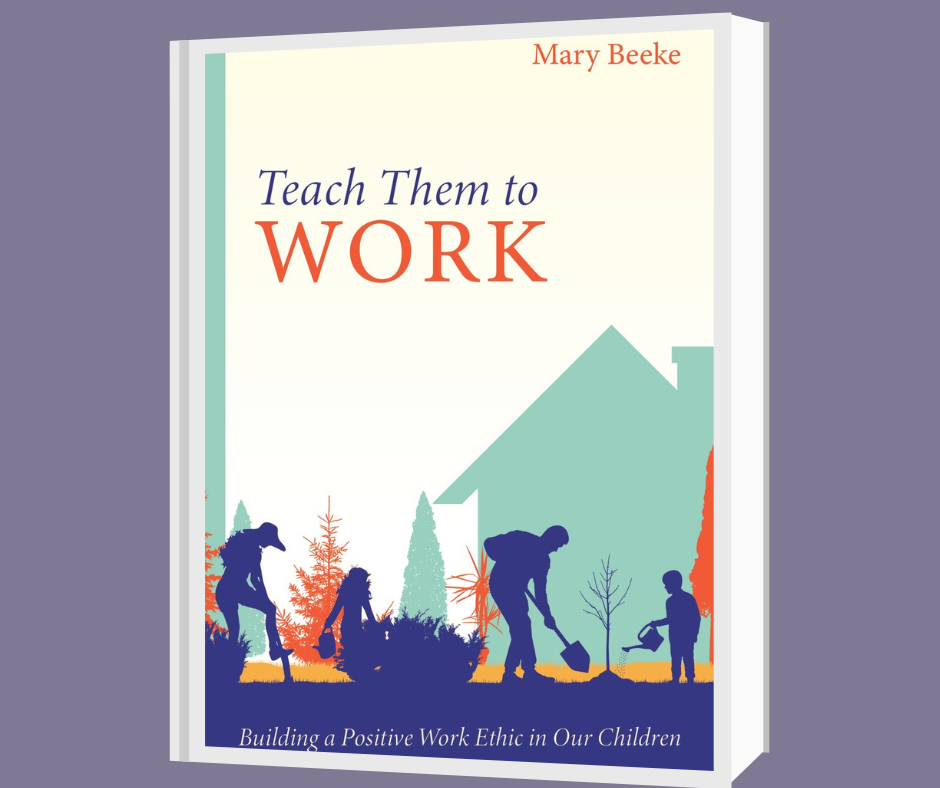Book Reviews
Teach Them To Work: Building a Positive Work Ethic in Our Children, by Mary Beeke | Review by Rosa Byler

No children were on the scene when God gave Adam the responsibility of “dressing and keeping” the garden. However, those original first-time parents must have soon realized what all parents learn: their offspring did not instinctively know how or even want to participate in that mandate. Training children to accomplish tasks, see the value of work, and actually enjoy it is a tall order, and the way is long (157,752 hours from birth to age eighteen! [53]). Parents themselves need teaching and frequent encouragement to persevere in the process and will find this book just such a resource.
Teach Them to Work is divided into Parental Principles and Practical Principles; but the book is loosely organized, with biblical basics interspersing methods, stories, and advice throughout. Study questions are at the very end. Mary Beeke’s style is informal and will remind readers of a conversation with a helpful grandmother. She evidences gracious humility in spite of her obvious experience and acknowledges her own misconceptions and failures. Young parents will profit from hearing that no parent does it perfectly, but wise ones learn from others.
A brief history of work outlines God’s work at creation, His ongoing work of redemption, and how man’s work changed after the Fall. Mrs. Beeke emphasizes God as the source of all truth and Scripture as the foundation for all of life. General child-training principles such as subduing the child’s will, creating a positive home atmosphere, and working together occupy much of the first section. For parents who realize changes are needed, a sample family-meeting format is included. One chapter is devoted to screen time, a subject without which no modern parenting book would be complete.
The second section provides further specifics concerning work with children of all ages and working styles, again with frequent real-life examples. Mrs. Beeke discusses diligence, “working smart” (having a plan), and observing children’s early interests and apparent talents. Children are “miniature scientists who run experiments during most of their waking hours” (143), and learning is more effective when suitable natural consequences are allowed. She suggests children learn as many basic life skills as they can before reaching the teen years, when hormonal changes often intensify power struggles.
Should parents give allowances or pay for work? Mrs. Beeke argues that it is good for children to learn to manage money, ideally starting young. Parents need to intentionally portray the family as a unit that works together for the benefit of all, with praise the normal reward. However, the useful skills of saving, budgeting, tithing, and avoiding debt are best taught through practice with a child’s own money—and parents also gain significant disciplinary leverage.
Joyful service is to be encouraged within the household and also to others. Most children are not naturally empathetic; some may not recognize their own feelings until a more experienced person helps them. Mrs. Beeke gives numerous examples of “the inestimable privilege of serving others.” (171)
The last chapter deals with rest or sabbath, an essential part of any study of work, covering the basics but leaving room for more thought. An appendix gives a short list of “Age-Appropriate Chores for Children,” and the bibliography suggests resources for further reading.
The Beekes are Reformed, and readers will note such terms as the “covenant of works” briefly referenced; yet salvation is described simply and without peripheral controversies. The Westminster Shorter Catechism is also mentioned. Noticing a large family with an obviously healthy work ethic, the Beekes asked the parents about their method. In addition to prayer and scripture memorization, they had taught their children the catechism, reasoning that “if biblical doctrines [were] firmly settled in their minds, everything else would be built on that foundation.” (17) Whatever one’s understanding of the Westminster Catechism, this is a needed reminder of parental responsibility—as is the rest of the book.